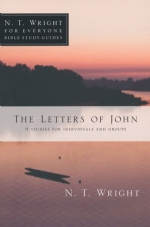$7.99
If you are already a Laridian customer, log in above and we can tell you if you own this product.
Preview Book
Preview the table of contents and a limited selection of text from this book.
 N.T. Wright for Everyone Bible Study: The Letters of John
N.T. Wright for Everyone Bible Study: The Letters of John

N.T. Wright for Everyone Bible Study: The Letters of John
$7.99
Buy It Once, Use It On These Platforms
About this Series
The widely respected pastor and New Testament scholar, N. T. Wright, walks you book by book through the entire New Testament in this series. Perfect for group use or daily personal reflection, these studies use the popular inductive method combined with Wright's thoughtful insights to bring contemporary application of Scripture to life.
About this Volume
In his letters, John expresses delight at believers who are "walking in the truth," behaving with that integrity which reflects the gospel. This involves not just correct doctrine and proper outward behavior, but also love for God and fellow believers. It's this love, John writes, that shows that the truth of the gospel has really been grasped, not as an abstract idea but as what it is, the very life of God himself at work in his people. These nine studies help us become believers who are "walking in the truth" in our own day--people in whom the very life of God is at work for all to see.
This volume also available as part of a money-saving bundle.
Features
- Includes suggestions for individual and group study (with leader's guide)
- Features the popular inductive Bible study method with notes and comments from a world-renowned New Testament scholar
- Designed specifically for lay people to facilitate contemporary application of Scripture
From the Preface
I have seen the future; and it works." That notorious statement was made by an American journalist, Lincoln Steffens, in 1919. He had just returned from a visit to the recently established Soviet Union, formed on Marxist principles after the Russian Revolution had swept away the old aristocracy and its method of government. Steffens echoed the hopes of millions in Europe and America. Perhaps this entirely new ideal, this new way of ordering human society, was the answer to all the old problems of tyranny and oppression. Perhaps this was indeed the future, the thing that would come to the rest of humanity as a great revelation, a great display of enlightened progress. We would all catch up one day; but for the moment Steffens, at least, had had a glimpse into that future and declared that it worked.
Subsequent history has revealed, of course, that Soviet Marxism only "worked" in the sense of achieving certain ends at the enormous cost of human lives. The Soviet system, like other revolutionary regimes, found it necessary to imprison or kill millions of its own subjects, as well as enslave several adjacent nations. When it finally came crashing down under its own dead weight in the late 1980s, it became apparent that it had been rotten and hollow inside for many years, perhaps all along. But that sense Lincoln Steffens had of a glimpse of the future, of an advance display of the new world waiting to be born, is exactly the picture the apostle John offers in his short but glowing letter we call 1 John. The ancient Jews believed that world history was divided into two periods or ages. There was the present age, which was full of misery and suffering, injustice and oppression; and there was the age to come, the time when God would sort it all out, would put everything right and would in particular rescue his people from the evil they had suffered.
Now, John says, God has provided an advance display of this future! God has kept the age to come under wraps, waiting to reveal it at the right time. But the secret at the heart of the early Christian movement was that the age to come had already been revealed. The future had burst into the present, even though the present time wasn't ready for it. The word for that future was Life: Life as it was meant to be; Life in its full, vibrant meaning; a Life which death tried to corrupt, thwart and kill but a Life which had overcome death itself and was now on offer to anyone who wanted to come and take it. Life itself had come to life, had taken the form of a human being, coming into the present from God's future, coming to display God's coming age. And the name of that Life-in-person is of course Jesus.
John, the author of this and two other letters we will study in this guide, is most likely the same John who wrote the Gospel that bears his name. This would be the same John who was one of original twelve apostles.
In the first two letters, John writes against deceivers, false prophets, anti-messiahs. We can't be sure exactly who these people were that John was challenging because there were so many religious movements, as well as political ones, in the first century. It's quite possible the false prophets John has in mind didn't belong to any particular group that we know of from elsewhere. But in several places John emphasizes the physicality of Jesus--that he had a body--and warns his readers to reject those who say Jesus did not come in the flesh. Such a belief looks suspiciously like one religious movement that came to be known as Gnosticism--a kind of religion that specialized in secret knowledge (from the Greek word gnosis), a knowledge revealed to the elect. According to this system of belief, by gaining this knowledge one might escape entirely from the physical world, and enter a realm of pure spirit.
Gnostics claimed there was some kind of manifestation of a "Jesus" who seemed to be human, even if he was not fully so. But they couldn't allow that this "Jesus" would actually die, be really dead. And because they claimed he didn't die, they also denied his bodily resurrection. For them the resurrection would have only had a spiritual dimension. Yet to deny his death and bodily resurrection was not just to deny something about Jesus. It was denying something about God. No other god, no other power, no other being in all the world loved like this, gave like this, died like this. All others win victories by fighting; this one, by suffering. All other gods exercise power by killing; this one, by dying.John emphasizes that the Spirit enables us to bear witness to what the Father has done in sending the Son. He reminds us forcefully that such witness must of course come not in word only but also in deed, as we read in 1Jn 3:18. Our love must come in the flesh, just as God's love did in Jesus.
About the Author(s)
N. T. Wright, formerly bishop of Durham in England, is research professor of New Testament and early Christianity at the University of St. Andrews in Scotland. He was formerly canon theologian of Westminster Abbey and dean of Lichfield Cathedral. He also taught New Testament studies for twenty years at Cambridge, McGill and Oxford Universities. Wright's full-scale works The New Testament and the People of God, Jesus and the Victory of God and The Resurrection of the Son of God are part of a projected six-volume series titled Christian Origins and the Question of God. Among his many other published works are Surprised by Hope and Simply Christian.
System Requirements
Installed size (unless otherwise indicated): Approximately 108.875 KB. iPhone, iPad, and iPod touch Requires iPhone, iPod touch, or iPad running latest version of iOS. Download size: 108.875 KB. Android Requires Android OS 4.4 or later. Download size: 108.875 KB. Windows Requires Windows 10, 11 or later. Download size: 108.875 KB. macOS Requires macOS 10.13 or later. Download size: 108.875 KB.
The Fine Print
Copyright © 2010-2026 by Laridian, Inc. All Rights Reserved.
Laridian and PocketBible are registered trademarks of Laridian, Inc. DailyReader, MyBible, Memorize!, PrayerPartner, eTract, BookBuilder, VerseLinker, iPocketBible, DocAnalyzer, Change the way you look at the Bible, and The Bible. Anywhere. are trademarks of Laridian, Inc. Other marks are the property of their respective owners.
About You
- You are viewing the mobile version of our website.
- You are not logged in.
- Your IP Address: 216.73.216.171
- Site IP Address: 69.167.186.191
Social Media
Like and follow us on Facebook.
Stay Informed
We announce new products via email. If you ask to be removed from any of our mailings, you will not receive these notifications. If your email address changes, make sure you change it here, too.
From time to time we post things on our blog and on Facebook.
The Fine Print
Copyright © 2010-2026 by Laridian, Inc. All Rights Reserved.
Laridian, PocketBible, and MyBible are registered trademarks of Laridian, Inc. DailyReader, Memorize!, PrayerPartner, eTract, BookBuilder, VerseLinker, iPocketBible, DocAnalyzer, Change the way you look at the Bible, and The Bible. Anywhere. are trademarks of Laridian, Inc. Other marks are the property of their respective owners.
Products by Platform
Bible Reader Software
BookBuilder Software
- BookBuilder for Windows
- BookBuilder Pro for Windows
- BookBuilder for macOS
- BookBuilder Pro for macOS
- Self-Publishing Info
About Laridian
Products by Type
Your Account
- You are not logged in.
- Your IP Address: 216.73.216.171
- Site IP Address: 69.167.186.191
- Your Account Information
- Your Order History
- Your Downloads
- Your Notes, Highlights, and Bookmarks
- Your BookBuilder Books
- Your Shopping Cart
- Register Purchase from a Store
Best Ways to Get Help
You can get the fastest help by helping yourself.
- Make sure you download and install the PocketBible app that is required to read the Bibles or books you bought
- Read the confirmation email we send you when you make a purchase
- Read the help that's built into each of our products
- Look through our Frequently Asked Questions
- Submit a Support Ticket
- Email us at support@laridian.com






